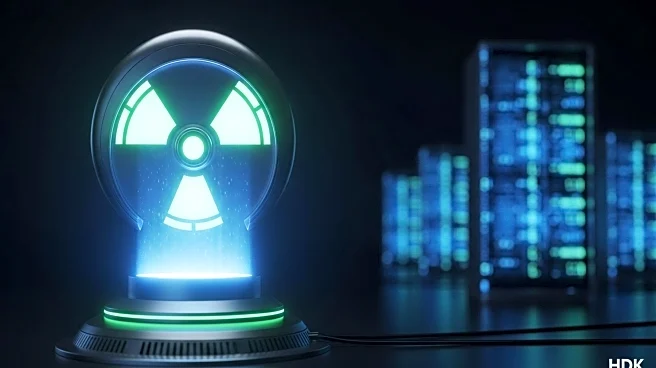What's Happening?
The Three Mile Island nuclear power plant, known for the worst commercial nuclear accident in U.S. history, is set to be restarted in 2027 as the Crane Clean Energy Center. This revival is part of a power purchase agreement with Microsoft, highlighting a trend where major tech companies are investing in nuclear energy to power data centers. Meta has also engaged in a similar deal, saving a nuclear plant in Illinois. These agreements reflect a growing interest in nuclear power as a stable, low-carbon energy source to meet the increasing energy demands of data centers, driven by the rise of artificial intelligence and cloud computing. The U.S. government has supported this shift, with policy initiatives aimed at tripling global nuclear energy capacity by 2050.
Why It's Important?
The resurgence of nuclear power is significant as it offers a reliable and low-emission energy source, crucial for meeting the growing energy demands of data centers. This shift is driven by tech companies' willingness to invest heavily in nuclear facilities, ensuring long-term power supply. The move could reshape the energy market by providing a stable baseload power source, complementing renewable energy sources like solar and wind. However, the revival of nuclear power faces challenges, including the need for substantial upgrades to aging infrastructure, cybersecurity enhancements, and workforce development. The success of these projects could influence future energy financing models, potentially extending beyond the tech industry.
What's Next?
The nuclear power revival will require overcoming several hurdles, including regulatory compliance, cybersecurity upgrades, and supply chain constraints. The industry must also address the shortage of skilled nuclear plant operators, as many have retired. The timeline for bringing these plants online is lengthy, necessitating patience and sustained investment. As these projects progress, the energy sector will need to maintain a diverse energy mix, with nuclear power complementing other sources like natural gas and renewables. The real test will be the successful transition from project announcements to operational facilities, ensuring that the nuclear renaissance is achieved without compromising safety or reliability.
Beyond the Headlines
The revival of nuclear power raises ethical and environmental considerations, particularly in light of past nuclear accidents. Ensuring robust safety measures and regulatory oversight will be crucial to gaining public trust. Additionally, the focus on nuclear energy highlights the broader challenge of balancing energy needs with environmental sustainability. The success of these projects could set a precedent for how other industries approach energy investments, potentially leading to a more diversified and resilient energy infrastructure.









